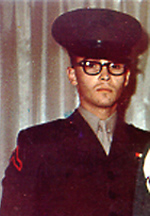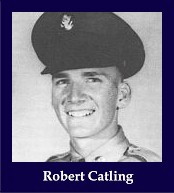
FRED C SPINA - LCPL
- HOMETOWN:
- woodbury
- COUNTY:
- Gloucester
- DATE OF BIRTH:
- August 06, 1949
- DATE OF CASUALTY:
- September 11, 1968
- BRANCH OF SERVICE:
- Marines
- RANK:
- LCPL
- STATUS:
- KIA
- COUNTRY:
- South Vietnam
Biography
Fred C. Spina was born on August 6, 1949. His home of record is Woodbury, NJ. He graduated from Woodbury High School in 1967.
Fred always wanted to be a Marine, so after graduation Fred entered the US Marine Corps where he attained the rank of Lance Corporal (LCPL). He attended boot camp at Parris Island and received advanced training at Camp Pendleton, CA. He served in Company F, 2nd Battalion, 5th Marines, 1st Marine Division.
He was wounded in combat on several occasions and returned to the field each time after recovering from his injuries.
On September 11, 1968, Spina was killed in action when his platoon was sent on a night ambush of a suspected enemy river crossing in the Quang Nam Province in South Vietnam, and was ambushed. He was 19 years old.
Spina was awarded two Purple Hearts.
Fred
August 6, 1949-September 11, 1968
LCPL, Marines Woodbury, NJ
A letter Fred Spina wrote to his mother a few months before he was killed remains a source of her strength and faith. Fran Spina carries the letter in her purse as an important touchstone to her son's memory.
A letter Fran had written to Fred was in his pocket when he died. In it, she described a dream she had. "A statue of the Blessed Mother was crying and I was picking up the tears," she says. "I took it as a symbol of faith and feel that Fred did, too." Sweat stained and barely in one piece, the letter gave Fred comfort and inspiration when the conditions he faced were intolerable.
Fred wanted to be a Marine from the time he knew what a Marine was. A photo of him, when he was fourteen, shows him in full uniform with relics of his family's military service spread out on his bed. He read every history book about war that he could find, and watched every war movie shown on television. He played all the war games and studied military tradition. Fred entered the Marine Corps two weeks after graduating from Woodbury High School in 1967.
Fred's father, Fred S. Spina, was an Army infantryman in World War II. He fought the Japanese at Luzon in the Philippines. His son was not impressed. "He once told me to my face that the Marines were better than any infantry," he says. "And then he tells me that the Marines only fought when and where no one else could. He would have made it big in the Corps."
Fred and his father spent days, and sometimes weeks, at the Jersey shore fishing and crabbing. "He loved it," Fred recalls. "And he could swim like a fish, too. We really had some good times together."
Fred was also an excellent wrestler. He was on the junior varsity his sophomore and junior years before making the varsity team as a senior. He collected coins, stamps, and was interested in photography. He loved baseball and was an avid Yankee fan.
"That's the only thing I never forgave him for," says Joe Spina, of Thorofare, NJ, and a life-long Phillies fan. Joe and Fred were double cousins. Their fathers were brothers and their mothers were sisters. The physical resemblance between Joe and Fred led many to mistake them for twins. "We were close in so many ways," Joe says. "In my life, I've had two of what I consider to be best, best friends. My wife is one of them, and Fred was the other."
The two families lived in adjoining houses in Thorofare until the boys were nine when Fred's family moved to Jackson Street in Woodbury, NJ.
Gary Mollet was a Jackson Street neighbor who Fred immediately befriended. Together, they mowed lawns, shoveled snow and shared a paper route; always splitting the profits. Gary wants Fred to be remembered as a good kid. But then he adds, "He was more than a friend. He and I were like brothers, but the kind that never fought. I don't ever remember having a fight with him. He was a good, loyal friend."
Joe's relationship with Fred grew even closer after Fred's move to Woodbury. They played countless sandlot baseball games with Gary and others. They lived together while working summers at the farm run by their aunt and uncle. They attended catechism classes at church, and often went to the local newsstand instead. If there was anyone who knew Fred, it was Joe.
"There was never any doubt that Fred was going to be a career Marine. That's all he ever wanted," reflects Joe. "Fred accomplished more in his short lifetime than most of us by fulfilling his childhood dream."
After boot camp at Parris Island, SC, and advanced training at Camp Pendleton, California, Fred was sent to Vietnam in December, and was initially assigned to the Security Headquarters and Service Company of the 1st Medical Battalion, 1st Marine Division. They were responsible for securing the evacuation and initial care of the wounded. They were in heavy contact with the enemy, often while the division conducted sweeps and 'pacification' raids on suspected Viet Cong strongholds.
The photos Fred sent home show the desolate and war-torn tropical countryside of central Quang Nam province. Some show him hamming it up with his buddies between rescue operations. One is of Fred relaxing on a sand-bagged wall of a bunker just outside of his hootch.
He was soon transferred and found himself in the jungles on a daily basis. His new address was Company F, 2nd Battalion, 5th Marines, 1st Marine Division. On August 4th, Fred was wounded when a booby trap exploded, killing one and wounding three others. Two days later, on his nineteenth birthday, his face and hands were burned when US forces accidentally dropped napalm on his unit's position.
"They kept sending him back into combat," Fran says. "He would recover and back to the "bush" he went. They were supposed to take them out of the field when they were wounded three times. I think Fred had other wounds that weren't reported. But he would have never insisted on it."
Fran Spina received a phone call from her son on August 11, 1968. Through a system set up by HAM radio operators, soldiers could call home briefly, and Fred made the most of his chance. It would be her last contact with him. He did not mention his wounds. He told her that he loved her and looked forward to coming home. He wanted to know everything about everybody in five minutes. Fran remembers being irritated at having to say "Over" after every sentence. "It was so hard to remember to do," she says. "But it was great talking to him. He was proud to be there and he was close to the other Marines around him."
A month had passed since that conversation and receiving any mail from Fred. Fran became increasingly anxious because it was unlike him to go as long as a week without writing. She recalls, "My friends at the PTA would always asked if I heard from Fred yet, and I would say, 'No, but the Pentagon sure heard from me!'"
Fran placed several calls and was told that information about any of the servicemen would have to come from the men themselves. "I have no idea what the last month of my son's life was like," she says. "I only know that he was doing what he had to do and that was being a Marine."
On September 11, 1968, Fred's platoon was ordered on a night ambush of a suspected enemy river crossing. As they moved closer to their initial position, they themselves were ambushed and in the firefight that ensued, Fred was wounded severely by automatic weapons fire. A corpsman did everything he could, but Fred never regained consciousness and died on the battlefield. Six other Marines in the platoon were killed and nine more wounded.
Fred's father was working a rare Saturday overtime shift at the Mobil refinery in Paulsboro, NJ. "Out of nowhere, my boss comes up to me and tells me my son was killed, and that the Marines were waiting for me at the house," he says. "I drove home in a daze. I kept thinking about Fran and that Fred had just turned nineteen. It was the longest drive home ever."
"I don't remember too much after the two Marines came to see us that day," Fran says. "The wait to get his body back was hard but family and friends kept me going. I just can't recall many details of what went on. I do know there was plenty of love and support around for us. We needed it. Fred's two brothers and sister were not ready to be put through that. None of us were."
To perpetuate her son's memory, Frances donated the money to erect a flagpole in Fred's honor at Saint Patrick's Church in Woodbury. The ceremony took place on Mother's Day of 1969. The news photo of the event shows Fred's eleven year-old brother in the Marine dress blues that Fred had given him.
As devastating as her loss was in 1968, Fran recalls a more painful time in April of 1975. "You know what hurt me the most?" she asks. "The day South Vietnam fell to the communists. I was working at the rectory at Saint Pat's as a housekeeper. I cried that day. When the monsignor called me in to find out what was wrong, I told him, 'It hurts more because now I feel my son died in vain.' That was a hard day for me."
Fran resents the fact that a blanket amnesty was given to those who fled to Canada to avoid the draft long before any recognition was given to those who served. With an angry passion in her voice, she says, "Canada was so great to them during the Vietnam War, I feel that's where they should have stayed. It's not fair to my son and it's not fair to all those who were forgotten when they returned. At least my son is at peace now."
Fred Concetto Spina was buried in Saint Joseph's Cemetery in Swedesboro, NJ, on September 19, 1968, following a Requiem Mass at Saint Patrick's. Father Joseph Di Mauro, with a full church, celebrated Fred's life by reading the letter that his mother still carries in her pocketbook, and in her heart.
Well, I'm now nineteen years old but I still don't feel any smarter or wiser. Maybe some day, when I become an old man, I might become wiser. It's Sunday morning now and I went to church and received Communion. For some reason, I feel really clean. I don't mean physically, but mentally. Church really means a lot to me out here. I guess because being out in the bush makes me feel a lot closer to God. I really never understood church or the meaning of prayer until now. I guess the bush makes a guy grow up real fast, he has to or he won't survive. He also has to believe in God to see him through this. If not, again he won't survive. I believe in God.
The rosary that I got when I received my first Holy Communion, well, I carry that with me always. I also wear my Saint Christopher's medal and a little cross that says I am a Catholic. If they see me through this war, I shall give them to John, Mike and Mary. And hope that they shall have good luck always, providing they believe in God.
Excerpt from They Were Ours: Gloucester County's Loss in Vietnam
by John Campbell
Used with permission of author
Sources: John Campbell and NJVVMF.
Remembrances
Be the first to add a remembrance for FRED C SPINA
Help preserve the legacy of this hero, learn about The Education Center.
LEARN MORE
